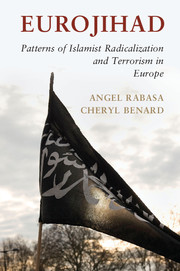Book contents
- Frontmatter
- Contents
- List of figures
- List of tables
- Preface
- Acknowledgments
- List of abbreviations
- 1 Introduction
- 2 Europe’s Muslim Populations
- 3 Salafism and Radical Islamism in Europe
- 4 Origins of Radical Islamist Networks in Europe
- 5 Radicalization Patterns
- 6 Radicalization and Recruitment Nodes
- 7 Evolution of Radical Networks in Europe
- 8 Terrorist Operations and Tactics
- 9 New European Approaches
- 10 Key Judgments
- Bibliography
- Index
- References
4 - Origins of Radical Islamist Networks in Europe
Published online by Cambridge University Press: 05 November 2014
- Frontmatter
- Contents
- List of figures
- List of tables
- Preface
- Acknowledgments
- List of abbreviations
- 1 Introduction
- 2 Europe’s Muslim Populations
- 3 Salafism and Radical Islamism in Europe
- 4 Origins of Radical Islamist Networks in Europe
- 5 Radicalization Patterns
- 6 Radicalization and Recruitment Nodes
- 7 Evolution of Radical Networks in Europe
- 8 Terrorist Operations and Tactics
- 9 New European Approaches
- 10 Key Judgments
- Bibliography
- Index
- References
Summary
Europe’s experience with Islamist terrorism started decades ago when Middle Eastern terrorist organizations established networks in Europe. The first generation of Islamist extremists in Europe consisted of asylum seekers and refugees. These were individuals who had been politically active before they arrived in Europe and brought their experience and, in some cases, their battles and political agendas with them. Some of the leading ideologues of radical Islamism in Europe fall into this category. In some cases, recent refugees turned against the host country and its culture because that country’s government supported the regime they opposed or took a foreign policy stance that was inimical to their broader political values or because they became exposed to a more global agenda while in the West.
France was the first Western country to be targeted by international Middle East–based Islamist terrorist networks. France’s intimate involvement in Algerian affairs caused it to be targeted by Algerian Islamist networks after the Algerian government canceled the elections in 1992 that the Islamist coalition Islamic Salvation Front (FIS) was on the verge of winning, and Algeria entered a cycle of massive terrorist and counterterrorist violence.
The Algerian networks were built around a small group of former Algerian volunteers in the Afghan war in the 1980s and organized in the Armed Islamic Group, known as GIA, the acronym for its French name, Groupe Islamique Armé. Beginning in 1993, the GIA started to assassinate French expatriates in Algeria, 42 in all between 1993 and 1996. The French government, which closely monitored exiled Algerian Islamists on its territory, quickly responded by unleashing an all-out war against these networks. In a chilling prelude to the September 11, 2001, attacks, a GIA team hijacked an Air France flight in Algiers in December 1994. The hijacking was foiled when French special forces stormed the aircraft in Marseilles, and it was later revealed that the hijackers were planning to crash the plane in Paris, possibly into the Eiffel Tower.
- Type
- Chapter
- Information
- EurojihadPatterns of Islamist Radicalization and Terrorism in Europe, pp. 41 - 55Publisher: Cambridge University PressPrint publication year: 2014



